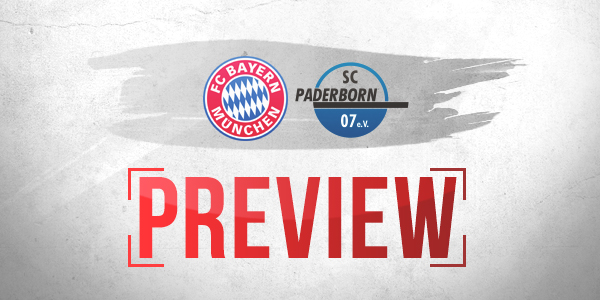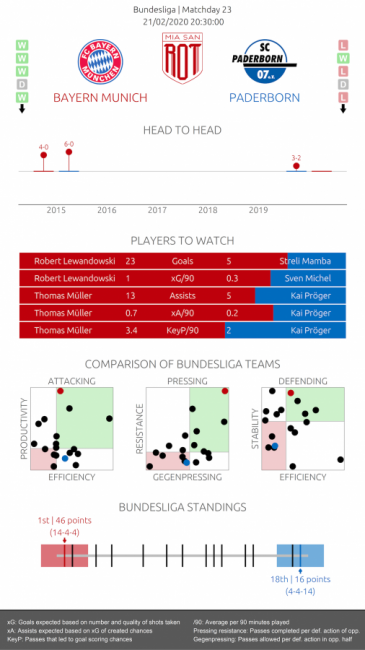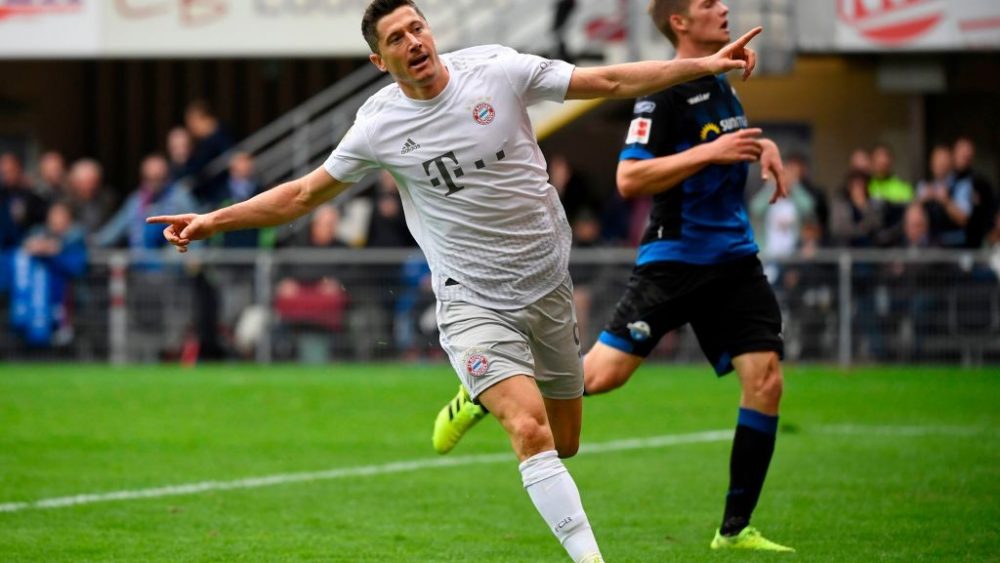Bundesliga MD 23 Preview: Bayern against Paderborn
“If things go as expected, we’ll get a hammering,” Paderborn coach Steffen Baumgart said before his team’s visit to the Allianz Arena. “There must be a lot going for us if we are to win a point.” Translation: Bayern can only beat themselves if they are as complacent and sloppy as they have been in some of their recent second halfs. Actually, that quite about sums up almost everything there is to say about the game on Friday evening.
There are games where a detailed tactical analysis makes sense, and then there are those where it is not the tactical details that matter, but the attitude. As Hansi Flick so aptly put it at Bayern’s pre-match press conference: “They want to play football and so far, they have earned points far below their value. That’s what sets them apart from many other teams in the Bundesliga.” Then he rightly added: “We noticed in the reverse fixture how difficult it can get.” For this reason alone it is worth taking a closer look what makes Paderborn different from many other Bundesliga clubs.

SC Paderborn: A refreshing addition to the Bundesliga
3-3 away to Dortmund, a narrow 2-3 defeat at home against Leipzig and the lively 2-3 in the reverse fixture against FC Bayern – there are enough examples of how unpleasant an opponent Paderborn can be in what is a complicated season for them. After a long run with seven defeats, one draw and five points short of the relegation game place 16 at the beginning of the season, one thing was clear for many: This Paderborn side is quite brave, but it will not be enough in the end.
In the following 14 games up to now, Baumgart’s team collected 15 points from four wins, three draws and seven defeats. Over the same period, Hertha, Frankfurt, Düsseldorf and Bremen fared worse. In the current Bundesliga standings, the gap to 16th place (Düsseldorf) is one point.
If one were to encapsulate Paderborn’s playing style in just one statistic, this would probably be “Passes Per Defensive Action” (PPDA), i.e. the average number of passes Paderborn allows their opponents to play in their half before they intervene. The value here is 11.59. This puts them in 10th place in the league with only Cologne at 10.53 having a better value among the teams at the bottom.
Adjustment to the higher level
In Baumgart’s preferred 4-2-3-1 formation his team is quite flexible against the ball. They mostly press in a 4-4-2, but in some situations switch to a 4-1-4-1 or 4-2-3-1-like shape. Baumgart varies the Intensity of his team’s pressing according to the opponent they face. Hertha last week was allowed only 9.23 passes on average until a defensive action was taken. Against Schalke, it was 16.3. The 3-3 draw in Dortmund saw Dortmund play 31.86 passes on average before a Paderborn intervention, and Bayern averaged 16.9 passes in their away game against the newly promoted side last autumn.
The spread shows: Paderborn is more cautious against stronger teams, opting to press from a deeper midfield position. Baumgart has learned over the course of the season to adapt himself and his football to the higher level. Even teams from the bottom of the table are at least slightly superior to his own on a per player basis. In such cases, Paderborn try to increase the pressure by more aggressively closing down their opponents higher up the pitch to force an open exchange of blows at eye level.
More pertinent from the perspective of Bayern is Paderborn’s other plan which they often use against the strongest teams in the league: The blueprint for a successful implementation was provided by the first half against Borussia Dortmund. In that game, Paderborn’s deeper front line forced Dortmund’s central defenders to take up a higher position. When Paderborn then won the ball, they were able to make use of the huge spaces behind Dortmund’s back four by sending their fast attackers into foot races with Dortmund’s slower defenders.
This plan required a high intensity against the ball. Even though Dortmund were in worse physical and mental shape then than they are now, it is not a matter of course for a promoted team to put up such a focused defensive performance for 45 minutes in the Westfalenstadion. A symbiosis of a tactically very limited Dortmund side and a team of aggressive and disciplined Paderborn players made it possible for the underdog to be up 0-3 at the break. Dortmund played only down the wings without involving the center, and so they played right into the visitor’s hands.
A lot of courage on the ball
Paderborn are strong when they can challenge the opponent on the wings. They are able to lash out from their compact 4-4-2 quickly and efficiently when they are not sufficiently pressed by the opponent. In the game against Dortmund, they at the same time managed to be creative with the ball. Here too, the opponent’s playing style played into their hands. Favre’s pressing is hardly ever man-oriented even during a high press.
Dortmund exerted pressure against the ball of a sort because they kept the spaces occupied, but Paderborn’s players were able to get into free positions again and again without being immediately put under pressure when they received the ball. With these short possession phases Paderborn took a high risk, but at the same time enjoyed some relief and brief spells of recovery.
And this is exactly what makes Paderborn so different from many other teams. On average, WhoScored lists only 13.2% of the SCP’s own passes as “long”. 56 long balls per game mean 16th place in the league, and a comparison with upstarts Union Berlin, for example, shows the difference: 18.6% of all passes by Union are classified as “long”. 72 per game is the highest value in the Bundesliga. Leverkusen (9.9%), Bayern (8.8%), Hoffenheim (11.3%), Bremen (12.2%), Dortmund (8.3%), Gladbach (11.2%) and Leipzig (9.1%) are the only teams with a smaller relative proportion of long balls in their own game.
It is this direct, aggressive and courageous style that made Paderborn’s promotion to the Bundesliga possible in the first place. At the same time, the season also showed that mistakes at this level are punished all the harder. Steffen Baumgart is still more than content with the progress his side as made so far. Because he knows that almost everyone in Paderborn stands behind him and his philosophy. And if Paderborn continue to be as eager to learn and as adaptive as they have proven to be, there is still a chance that they might stay in the league despite their significant quality disadvantage.
FC Bayern: Just do not think about Chelsea
As far as the match against Bayern is concerned, Baumgart will probably hope that Bayern gift him two of their recent second half performances. Bayern can learn a lot from Paderborn’s aforementioned match against Dortmund. If Bayern leave Paderborn too much room for their build-up play, they leave themselves vulnerable, especially considering their very high default positioning.
It will be important for Bayern to constantly force the visitors from Paderborn to make decisions. Then they will make mistakes and open the door. Dortmund was only able to show this in the second half, when Brandt, a player who constantly gravitates towards the half spaces, was on the pitch.
But the goals Bayern scored in the 2-3 away victory laid out a good pattern to replicate too. Bayern built up from the back via the full-backs, who put the ball into the half spaces, from where the wingers on either ran in behind the back line for the through ball. Simple principle (draw the opponent into the center and then play the ball into the resulting open spaces in behind), not always so easy to carry out. Because for this you need speed and precision.
In most of the recent first halves, Bayern were able to execute this tactic with breathtaking intensity. It remains to be seen whether they are able to take the next step and maintain control of a game when they deliberately lower the intensity for a time to save energy.
Paderborn will demand a lot from Bayern at any rate. But they will demand all the more if they are permitted to. In the end, the championship will not be decided in the few top matches of the season, as was wrongly suggested in many places before the match against Leipzig. It will be decided in moments like these, when FC Bayern are about to play their most important game of the season next Tuesday, but first have to summon their mental focus for a necessary duty. After all, every premature thought of Tuesday only makes a surprise on Friday evening more likely.





 February 21, 2020
February 21, 2020 





I think Bayern fell exactly into that dangerous trap. The game was thrilling yet frustrating to watch. I was impressed with Paderborn for their organization and determination (seriously this is the bottom team?) but Bayern didn’t help themselves by a lot of bad passes, bad touches, blunders, lack of focus and lack of intensity. I think the team played with Chelsea already in their mind, even if they didn’t do that intentionally. Luckily the 3 points still stay with us, now let’s recover quickly and I look forward to next Tuesday.